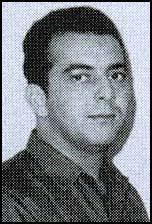Difference between revisions of "Rafael Quintero"
m (Text replacement - "|WP=https://" to "|wikipedia=https://") |
|||
| Line 1: | Line 1: | ||
{{person | {{person | ||
| − | | | + | |wikipedia=https://en.wikipedia.org/wiki/Rafael_Quintero |
|image=Rafael_Quintero.jpg | |image=Rafael_Quintero.jpg | ||
|spartacus=http://spartacus-educational.com/JFKquintero.htm | |spartacus=http://spartacus-educational.com/JFKquintero.htm | ||
Revision as of 13:41, 26 July 2016
(spook) | |
|---|---|
 | |
| Born | Rafael Quintero Ibaria September 16, 1940 Cuba |
| Died | October 1, 2006 (Age 66) Baltimore, Maryland, USA |
| Member of | Operation 40 |
Rafael "Chi Chi" Quintero Ibaria, was a spook and Operation 40 member involved in the JFK assassination and Iran-Contra drug/weapons dealing operation. He is apparently not to be confused with big time drug dealer Rafael Caro Quintero.
Background
In the 1950s, he joined the resistance movement against Cuban dictator Fulgencio Batista. A few days prior to the Cuban Revolution he joined Fidel Castro's group in the Sierra Maestra.[citation needed]
After becoming dissatisfied with the Castro regime he joined Manuel Artime against Castro. Artime's group was supported by Frank Sturgis and the CIA as related by Fabian Escalante in CIA Covert Operations: 1959 - 1962. Sturgis flew a CIA plane over Havana dropping thousands of pamphlets urging the Cuban people to overthrow the Castro regime on October 21, 1959 as part of Artime's operations. About December 1959, Manuel Artime left Cuba with a hundred thousand pesos when nothing happened. Quintero moved to the United States the next month.
CIA
On June 5, 1960, The Movement for the Recovery of the Revolution or (MRR) was created by Manuel Artime, Tony Varona, Aureliano Arango, Jose Miro Cardona and Quintero. About the same time Quintero became a member of Operation 40 along with other anti-Castro Cubans. In 1961 Quintero secretly re-entered Cuba and was arrested just prior to the Bay of Pigs Invasion, was released and returned to the U.S.
Rafael Quintero served as deputy leader of MRR under Artime in 1962. Manuel Artime got money from the CIA through Theodore Shackley in 1963. Artime, Quintero and Félix Rodríguez moved to Nicaragua creating an army of 300 men and obtained weapons, supplies and boats to invade Cuba.
JFK Assassination
- Full article: John F. Kennedy/Assassination
- Full article: John F. Kennedy/Assassination
In 2005, Gene Wheaton claimed, in an interview with William Law and Mark Sobel that Rafael Quintero and Carl Jenkins were both involved in the assassination of John F. Kennedy. Quintero never confessed to involvement in the assassination of JFK, but he reportedly stated "If I were ever granted immunity, and compelled to testify about past actions, about Dallas and the Bay of Pigs, it would be the biggest scandal ever to rock the United States."[1][2]
1970s
In 1976 Quintero was recruited by (Operation 40) Edwin Wilson to kill a Libyan dissident in Egypt[Who?]. Quintero chose Raoul Villaverde and Rafael Villaverde to carry out the killing. Four days before the assassination of Orlando Letelier, the Villaverde brothers returned to the United States. On 21st September, the day that Letelier was killed, Wilson phoned Quintero in Miami to call off the operation.[2]
Iran-Contra
- Full article: Iran-Contra affair
- Full article: Iran-Contra affair
Apparently under orders from Oliver North, Quintero set up and ran the arms-for-the-Contras branch of the operation, based at airstrips in El Salvador and Costa Rica, under the protection of US military advisers[Who?] who were legally based in these nations. Quintero recruited another Cuban exile, his old friend (terrorist) Luis Posada Carriles to run the operation at Ilopango airport in El Salvador.[1]
Death
Quintero died in Baltimore, Maryland after a history of kidney failure.[1][2]